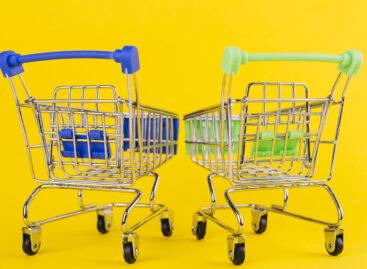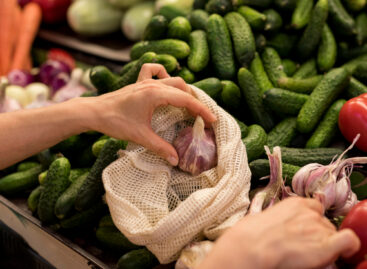Conscious consumers are living among us
According to GfK, Hungary’s GDP growth in 2019 was one of the best in the European Union. The engine of retail sales growth was the increase in purchasing power. Last year Hungarian households spent 6.1 percent more on consumer goods than a year earlier. On average they spent 8 percent more per buying occasion, but households went shopping less frequently than in the previous year.


Tünde Turcsán
commercial director
GfK
Discount supermarkets had become the No.1 retail channel in 2018 and they continued to strengthen their position in 2019. From their FMCG-budgets, household spent 28 percent in this channel, and 95 percent of them visited discounters regularly. One of the keys to discounters’ success was that the number of shopper visits increased considerably, to 63 occasions per year; this was 8 percent more than in 2018. Today Hungarians go to discount supermarkets more often than to small corner shops and they spend twice as much there on average (and 1.5 times more than in supermarkets). Drugstores also had a good year: in this channel buying frequency was up 11 percent, and the basket value was the third biggest behind hypermarkets and discount stores.
The proportion of private label (PL) products kept increasing in the last few years. After 29.7 percent in 2018 it grew to 31.4 percent in 2019. At the same time, the proportion of sales in promotion dropped from 26.8 percent to 25.9 percent. The most promotions are realised in hypermarkets. What makes promotion work? According to the respondents of a GfK survey from last year, it is successful if it offers real benefits and it isn’t misleading.
Hungarian shoppers are turning more and more conscious and sophisticated. They focus more on quality and pay attention to where products come from, plus they want them to be healthy and sustainable. Shoppers also expect products to be tailored to their personal needs. Consumers are thinking differently than before. Back in 2015, they said the biggest concerns at a global level were economic recession, unemployment and religious extremism; today much more people worry about pollution and global warming. In the autumn of 2019, the GfK Consumer Life study also revealed regional differences: on a global scale the two most important consumer trends are safety and problem-free life, but in Hungary, consumer and environmental consciousness are at the top of the ranking.
There is a kind of duality in consumers: they would like to do something for the environment, but they don’t want to give up their comfort either. We see a growing number of value-based brand managements e.g. green campaigns to win the heart of consumers. To a certain extent, consumers have lost their trust in the ‘mainstream’, as a result of which there are more and more start-up products in the market. These define themselves less by their prices and more by their benefits and the values they represent.
The breakout of the COVID-19 pandemic broke the momentum of retail trade in the spring of 2020 at both world level and in Hungary, which at the same time generated new peaks. GfK data reveals that in March Hungarian households spent 18 percent more on FMCG products and the basket size jumped 27.3 percent; however, buying frequency fell by 7.1 percent in comparison with March 2019. What we see at the product level is that uncertainty can change brand preferences, in the short term brand loyalty can decrease and store choice factors might change.
GfK conducted an international study about the effects of the pandemic on weeks 11-14 – in Hungary on week 14. This differentiated between three basic consumer reactions: panic, adaptation and return to normal. The results have revealed that Hungary is among the most disciplined countries as regards personal responsibility. We wash hands and use antibacterial hand sanitisers much more often than the average. Hungarians are less worried about their health and think they stockpile less food than consumers in other countries.
GfK Hungária also found that only 16 percent switched to a new shop because of the pandemic and 28 percent asked for home delivery. 27 percent did their shopping in online stores more times than before and 16 percent bought FMCG products online more often. Preferences have changed due to the crisis situation, people say they will focus more on life’s little joys and spend more time with their family and friends.
We don’t know when the coronavirus pandemic will end, but we can already draw a few conclusions. Brand management and product innovation will become more important. After each crisis, new needs emerge that must be satisfied. Continuous communication about the brand is necessary at these difficult times and after they end. Shoppers need to be convinced after the pandemic that they can relax when they go shopping and can spend more time in-store. Let’s not forget that the experiences people acquire during a crisis period have a bigger impact on them, and they will influence their decisions later! //
Related news
Shoppers don’t want sustainable, but they want organic?
In Germany the proportion of people who regularly buy sustainable…
Read more >Bence Gerlaki: the government helps develop consumer awareness in all age groups
The government is helping to develop consumer awareness in all…
Read more >German consumers save a record amount on sustainable food
The propensity to buy sustainable products in Germany has fallen…
Read more >Related news
On self-acceptance, self-liberation and the gift of everyday life – We were learning together (Business Days 2024 Part 2)
On Friday at the Business Days conference it was all…
Read more >Brand footprint – or what do Coca-Cola, Kinder and Riska have in common?
The results of the Brand Footprint research coordinated by CPS-YouGov…
Read more >








